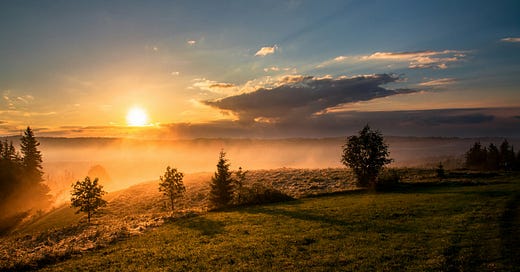God’s ways are not our ways. We can’t always (or even often) see what the plan is, so the best we can do is act within our conscience and God’s law as we know it. Our darkest moments just might be followed by our brightest future.
Reading 1
Am 9:11-15
Thus says the LORD: On that day I will raise up the fallen hut of David; I will wall up its breaches, raise up its ruins, and rebuild it as in the days of old, That they may conquer what is left of Edom and all the nations that shall bear my name, say I, the LORD, who will do this. Yes, days are coming, says the LORD, When the plowman shall overtake the reaper, and the vintager, him who sows the seed; The juice of grapes shall drip down the mountains, and all the hills shall run with it. I will bring about the restoration of my people Israel; they shall rebuild and inhabit their ruined cities, Plant vineyards and drink the wine, set out gardens and eat the fruits. I will plant them upon their own ground; never again shall they be plucked From the land I have given them, say I, the LORD, your God.
Here we come to the end of Amos. It’s a lot more upbeat than the rest of the book. That’s because God’s plans never end in destruction and death, but life. That’s why James during the Council of Jerusalm,1 quotes this passage—after Jesus’ life, death, and resurrection (“ I will raise up the fallen hut of David”), it’s clear to him that it’s time to bring the gentiles into the Church. That way, “all the nations that shall bear God’s name.”
Responsorial Psalm
Ps 85:9ab and 10, 11-12, 13-14
R. (see 9b) The Lord speaks of peace to his people.
I will hear what God proclaims;
the LORD–for he proclaims peace to his people.
Near indeed is his salvation to those who fear him,
glory dwelling in our land.
R. The Lord speaks of peace to his people.
Kindness and truth shall meet;
justice and peace shall kiss.
Truth shall spring out of the earth,
and justice shall look down from heaven.
R. The Lord speaks of peace to his people.
The LORD himself will give his benefits;
our land shall yield its increase.
Justice shall walk before him,
and salvation, along the way of his steps.
R. The Lord speaks of peace to his people.
Like our first reading, this is the second half of a Psalm that’s mostly a downer. The nation laments past sins and begs for forgiveness.
Here, a representative of the people steps forward, and hears God’s proclamations. And again like Amos, we don’t conclude with punishment, but grace.
Alleluia
Jn 10:27
R. Alleluia, alleluia.
My sheep hear my voice, says the Lord;
I know them, and they follow me.
R. Alleluia, alleluia.
One way to know what we should do is follow Jesus’ voice. He left some very clear instructions.
Gospel
Mt 9:14-17
The disciples of John approached Jesus and said, "Why do we and the Pharisees fast much, but your disciples do not fast?"
Jesus answered them, "Can the wedding guests mourn as long as the bridegroom is with them? The days will come when the bridegroom is taken away from them, and then they will fast. No one patches an old cloak with a piece of unshrunken cloth, for its fullness pulls away from the cloak and the tear gets worse. People do not put new wine into old wineskins. Otherwise the skins burst, the wine spills out, and the skins are ruined. Rather, they pour new wine into fresh wineskins, and both are preserved."
Jesus isn’t what anyone expected in a Messiah. Some wanted a warrior, some wanted a judge. And while He did fight and did exercise judgement, it wasn’t in the way people would have predicted.
As with yesterday’s reading, Jesus doesn’t care for others’ judgement. He knows when it’s an appropriate time to celebrate, and when it’s an appropriate time to mourn.
When we’re with Jesus, it’s not mourning time. That’s why we celebrate mass.



